- Home
- Stephen R. Donaldson
The Wounded Land Page 3
The Wounded Land Read online
Page 3
The debris of her treatment she stuffed into one of the plastic specimen sacks she carried. Then she returned to her car. As she slid into the front seat, she gripped the steering wheel with both hands to steady herself on its hard actuality.
She did not remember why she had come to Haven Farm until the book on the seat beside her caught her attention.
Oh, damn!
She felt intensely unready to confront Thomas Covenant.
For a moment, she considered simply abandoning the favor she had promised Dr. Berenford. She started the engine, began to turn the wheel. But the exigency of the old man’s eyes held her. That blue would not approve the breaking of promises. And she had saved him. She had set a precedent for herself which was more important than any question of difficulty or mortification. When she put the sedan into motion, she sent it straight down the dirt road toward the white frame house, with the dust and the sunset at her back.
The light cast a tinge of red over the house, as if it were in the process of being transformed into something else. As she parked her car, she had to fight another surge of reluctance. She did not want to have anything to do with Thomas Covenant—not because he was a leper, but because he was something unknown and fierce, something so extravagant that even Dr. Berenford was afraid of him.
But she had already made her commitment. Picking up the book, she left her car and went to the front door of the house, hoping to be able to finish this task before the light failed.
She spent a moment straightening her hair. Then she knocked.
The house was silent.
Her shoulders throbbed with the consequences of strain. Fatigue and embarrassment made her arms feel too heavy to lift. She had to grit her teeth to make herself knock again.
Abruptly she heard the sound of feet. They came stamping through the house toward her. She could hear anger in them.
The front door was snatched open, and a man confronted her, a lean figure in old jeans and a T-shirt, a few inches taller than herself. About forty years old. He had an intense face. His mouth was as strict as a stone tablet; his cheeks were lined with difficulties; his eyes were like embers, capable of fire. His hair above his forehead was raddled with gray, as if he had been aged more by his thoughts than by time.
He was exhausted. Almost automatically, she noted the redness of his orbs and eyelids, the pallor of his skin, the febrile rawness of his movements. He was either ill or under extreme stress.
She opened her mouth to speak, got no further. He registered her presence for a second, then snapped, “Goddamn it, if I wanted visitors I’d post a sign!” and clapped the door shut in her face.
She blinked after him momentarily while darkness gathered at her back, and her uncertainty turned to anger. Then she hit the door so hard that the wood rattled in its frame.
He came back almost at once. His voice hurled acid at her. “Maybe you don’t speak English. I—”
She met his glare with a mordant smile. “Aren’t you supposed to ring a bell, or something?”
That stopped him. His eyes narrowed as he reconsidered her. When he spoke again, his words came more slowly, as if he were trying to measure the danger she represented.
“If you know that, you don’t need any warning.”
She nodded. “My name is Linden Avery. I’m a doctor.”
“And you’re not afraid of lepers.”
His sarcasm was as heavy as a bludgeon; but she matched it. “If I were afraid of sick people, I wouldn’t be a doctor.”
His glower expressed his disbelief. But he said curtly, “I don’t need a doctor,” and started to swing the door shut again.
“So actually,” she rasped, “you’re the one who’s afraid.”
His face darkened. Enunciating each word as if it were a dagger, he said, “What do you want, doctor?”
To her dismay, his controlled vehemence made her falter. For the second time in the course of the sunset, she was held by eyes that were too potent for her. His gaze shamed her. The book—her excuse for being there—was in her hand; but her hand was behind her back. She could not tell the lie Dr. Berenford had suggested to her. And she had no other answer. She could see vividly that Covenant needed help. Yet if he did not ask for it, what recourse did she have?
But then a leap of intuition crossed her mind. Speaking before she could question herself, she said, “That old man told me to ‘Be true.’ ”
His reaction startled her. Surprise and fear flared in his eyes. His shoulders winced; his jaw dropped. Then abruptly he had closed the door behind him. He stood before her with his face thrust hotly forward. “What old man?”
She met his fire squarely. “He was out at the end of your driveway—an old man in an ochre robe. As soon as I saw him, he went into cardiac arrest.” For an instant, a cold hand of doubt touched her heart. He had recovered too easily. Had he staged the whole situation? Impossible! His heart had stopped. “I had to work like hell to save him. Then he just walked away.”
Covenant’s belligerence collapsed. His gaze clung to her as if he were drowning. His hands gaped in front of him. For the first time, she observed that the last two fingers of his right hand were missing. He wore a wedding band of white gold on what had once been the middle finger of that hand. His voice was a scraping of pain in his throat. “He’s gone?”
“Yes.”
“An old man in an ochre robe?”
“Yes.”
“You saved him?” His features were fading into night as the sun dropped below the horizon.
“Yes.”
“What did he say?”
“I already told you.” Her uncertainty made her impatient. “He said, ‘Be true.’ ”
“He said that to you?”
“Yes!”
Covenant’s eyes left her face. “Hellfire.” He sagged as if he carried a weight of cruelty on his back. “Have mercy on me. I can’t bear it.” Turning, he slumped back to the door, opened it. But there he stopped.
“Why you?”
Then he had reentered his house, the door was closed, and Linden stood alone in the evening as if she had been bereft.
She did not move until the need to do something, take some kind of action to restore the familiarity of her world, impelled her to her car. Sitting behind the wheel as if she were stunned, she tried to think.
Why you?
What kind of question was that? She was a doctor, and the old man had needed help. It was that simple. What was Covenant talking about?
But Be true was not all the old man had said. He had also said, You will not fail, however he may assail you.
He? Was that a reference to Covenant? Was the old man trying to warn her of something? Or did it imply some other kind of connection between him and the writer? What did they have to do with each other? Or with her?
Nobody could fake cardiac arrest!
She took a harsh grip on her scrambled thoughts. The whole; situation made no sense. All she could say for certain was that Covenant had recognized her description of the old man. And Covenant’s mental stability was clearly open to question.
Clenching the wheel, she started her car, backed up in order to turn around. She was convinced now that Covenant’s problem was serious; but that conviction only made her more angry at Dr. Berenford’s refusal to tell her what the problem was. The dirt road was obscure in the twilight; she slapped on her headlights as she put the sedan in gear to complete her turn.
A scream like a mouthful of broken glass snatched her to a halt. It pierced the mutter of her sedan. Slivers of sound cut at her hearing. A woman screaming in agony or madness.
It had come from Covenant’s house.
In an instant, Linden stood beside the car, waiting for the cry to be repeated.
She heard nothing. Lights shone from some of the windows; but no shadows moved. No sounds of violence betrayed the night. She I stood poised to race to the house. Her ears searched the air. But the dark held its breath. The scream did not come again.
For a long moment, indecision held her. Confront Covenant—demand answers? Or leave? She had met his hostility. What right did she have—? Every right, if he were torturing some woman. But how could she be sure? Dr. Berenford had called it a medical problem.
Dr. Berenford—
Spitting curses, she jumped back into her car, stamped down on the accelerator, and sped away in a rattle of dust and gravel.
Two minutes later, she was back in town. But then she had to slow down so that she could watch for street signs.
When she arrived at the Chief of Staff’s house, all she could see was an outline against the night sky. Its front frowned as if this, too, were a place where secrets were kept. But she did not hesitate. Striding up the steps, she pounded on the front door.
That door led to a screened veranda like a neutral zone between the dwelling itself and the outside world. As she knocked, the porch lights came on. Dr. Berenford opened the inner door, closed it behind him, then crossed the veranda to admit her.
He smiled a welcome; but his eyes evaded hers as if he had reason to be frightened; and she could see his pulse beating in the pouches below their sockets.
“Dr. Berenford,” she said grimly.
“Please.” He made a gesture of appeal. “Julius.”
“Dr. Berenford.” She was not sure that she wanted this man’s friendship. “Who is she?”
His gaze flinched. “She?”
“The woman who screamed.”
He seemed unable to lift his eyes to her face. In a tired voice, he murmured, “He didn’t tell you anything.”
“No.”
Dr. Berenford considered for a moment, then motioned her toward two rocking chairs at one end of the veranda. “Please sit down. It’s cooler out here.” His attention seemed to wander. “This heat wave can’t last forever.”
“Doctor!” she lashed at him. “He’s torturing that woman.”
“No, he isn’t.” Suddenly the older man was angry. “You get that out of your head right now. He’s doing everything he can for her. Whatever’s torturing her, it isn’t him.”
Linden held his glare, measuring his candor until she felt sure that he was Thomas Covenant’s friend, whether or not he was hers. Then she said flatly, “Tell me.”
By degrees, his expression recovered its habitual irony. “Won’t you sit down?”
Brusquely she moved down the porch, seated herself to one of the rockers. At once, he turned off the lights, and darkness came pouring through the screens. “I think better in the dark.” Before her eyes adjusted, she heard the chair beside her squeak as he sat down.
For a time, the only sounds were the soft protest of his chair and the stridulation of the crickets. Then he said abruptly, “Some things I’m not going to tell you. Some I can’t—some I won’t. But I got you into this. I owe you a few answers.”
After that, he spoke like the voice of the night; and she listened in a state of suspension—half concentrating, as she would have concentrated on a patient describing symptoms, half musing on the image of the gaunt vivid man who had said with such astonishment and pain, Why you?
“Eleven years ago, Thomas Covenant was a writer with one bestseller, a lovely wife named Joan, and an infant son, Roger. He hates that novel—calls it inane—but his wife and son he still loves. Or thinks he does. Personally I doubt it. He’s an intensely loyal man. What he calls love, I call being loyal to his own pain.
“Eleven years ago, an infection on his right hand turned out to be leprosy, and those two fingers were amputated. He was sent down to the leprosarium in Louisiana, and Joan divorced him. To protect Roger from being raised to close proximity to a leper. The way Covenant tells it, her decision was perfectly reasonable. A mother’s natural concern for a child. I think he’s rationalizing. I think she was just afraid. I think the idea of what Hansen’s disease could do to him—not to mention to her and Roger—just terrified her. She ran away.”
His tone conveyed a shrug, “But I’m just guessing. The fact is, she divorced him, and he didn’t contest it. After a few months, his illness was arrested, and he came back to Haven Farm. Alone. That was not a good time for him. All his neighbors moved away. Some people in this fair town tried to force him to leave. He was to the Hospital a couple times, and the second time he was half dead—” Dr. Berenford seemed to wince at the memory. “His disease was active again. We sent him back to the leprosarium.
“When he came home again, everything was different. He seemed to have recovered his sanity. For ten years now he’s been stable. A little grim, maybe—not exactly what you might call diffident—but accessible, reasonable, compassionate. Every year he foots the bill for several of our indigent patients.”
The older man sighed. “You know, it’s strange. The same people who try to convert me seem to think he needs saving, too. He’s a leper who doesn’t go to church, and he’s got money. Some of our evangelicals consider that an insult to the Almighty.”
The professional part of Linden absorbed the facts Dr. Berenford gave, and discounted his subjective reactions. But her musing raised Covenant’s visage before her in the darkness. Gradually that needy face became more real to her. She saw the lines of loneliness and gall on his mien. She responded to the strictness of his countenance as if she had recognized a comrade. After all, she was familiar with bitterness, loss, isolation.
But the doctor’s speech also filled her with questions. She wanted to know where Covenant had learned his stability. What had changed him? Where had he found an answer potent enough to preserve him against the poverty of his life? And what had happened recently to take it away from him?
“Since then,” the Chief of Staff continued, “he’s published seven novels, and that’s where you can really see the difference. Oh, he’s mentioned something about three or four other manuscripts, but I don’t know anything about them. The point is, if you didn’t know better, you wouldn’t be able to believe his bestseller and the other seven were written by the same man. He’s right about the first one. It’s fluff—self-indulgent melodrama. But the others—
“If you had a chance to read Or I Will Sell My Soul for Guilt, you’d find him arguing that innocence is a wonderful thing except for the fact that it’s impotent. Guilt is power. All effective people are guilty because the use of power is guilt, and only guilty people can be effective. Effective for good, mind you. Only the damned can be saved.”
Linden was squirming. She understood at least one kind of relationship between guilt and effectiveness. She had committed murder, and had become a doctor because she had committed murder. She knew that people like herself were driven to power by the need to assoil their guilt. But she had found nothing—no anodyne or restitution—to verify the claim that the damned could be saved. Perhaps Covenant had fooled Dr. Berenford: perhaps he was crazy, a madman wearing a clever mask of stability. Or perhaps he knew something she did not.
Something she needed.
That thought gave her a pang of fear. She was suddenly conscious of the night, the rungs of the rocker pressing against her back, the crickets. She ached to retreat from the necessity of confronting Covenant again. Possibilities of harm crowded the darkness. But she needed to understand her peril. When Dr. Berenford stopped, she bore the silence as long as she could, then, faintly, repeated her initial question.
“Who is she?”
The doctor sighed. His chair left a few splinters of agitation in the air. But he became completely still before he said, “His ex-wife. Joan.”
Linden flinched. That piece of information gave a world of explanation to Covenant’s haggard, febrile appearance. But it was not enough. “Why did she come back? What’s wrong with her?”
The older man began rocking again. “Now we’re back to where we were this afternoon. I can’t tell you. I can’t tell you why she came back because he told me in confidence. “If he’s right—” His voice trailed away, then resumed. “I can’t tell you what’s wrong with her because I don’t kn
ow.”
She stared at his unseen face. “That’s why you got me into this.”
“Yes.” His reply sounded like a recognition of mortality.
“There are other doctors around. Or you could call in a specialist.” Her throat closed suddenly; she had to swallow heavily in order to say, “Why me?”
“Well, I suppose—” Now his tone conveyed a wry smile. “I could say it’s because you’re well trained. But the fact is, I thought of you because you seem to fit. You and Covenant could talk to each other—if you gave yourselves a chance.”
“I see.” In the silence, she was groaning, Is it that obvious? After everything I’ve done to hide it, make up for it, does it still show? To defend herself, she got to her feet. Old bitterness made her sound querulous. “I hope you like playing God.”
He paused for a long moment before he replied quietly, “If that’s what I’m doing—no, I don’t. But I don’t look at it that way. I’m just in over my head. So I asked you for help.”
Help, Linden snarled inwardly. Jesus Christ! But she did not speak her indignation aloud. Dr. Berenford had touched her again, placed his finger on the nerves which compelled her. Because she did not want to utter her weakness, or her anger, or her lack of choice, she moved past him to the outer door of the veranda. “Goodnight,” she said in a flat tone.
“Goodnight, Linden.” He did not ask her what she was going to do. Perhaps he understood her. Or perhaps he had no courage.
She got into her car and headed back toward Haven Farm.
She drove slowly, trying to regain a sense of perspective. True, she had no choice now; but that was not because she was helpless. Rather it was because she had already made the choice—made it long ago, when she had decided to be a doctor. She had elected deliberately to be who she was now. If some of the implications of that choice gave her pain—well, there was pain everywhere. She deserved whatever pain she had to bear.
She had not realized until she reached the dirt road that she had forgotten to ask Dr. Berenford about the old man.

 The Illearth War
The Illearth War Last Chronicles of Thomas Covenant 02 - Fatal Revenant
Last Chronicles of Thomas Covenant 02 - Fatal Revenant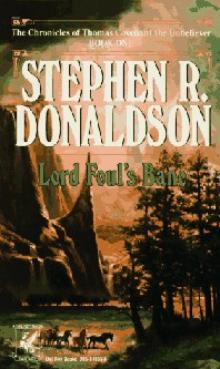 Lord Foul's Bane
Lord Foul's Bane The Gap Into Ruin: This Day All Gods Die
The Gap Into Ruin: This Day All Gods Die White Gold Wielder
White Gold Wielder Fatal Revenant
Fatal Revenant The Mirror of Her Dreams
The Mirror of Her Dreams Against All Things Ending
Against All Things Ending The Real Story: The Gap Into Conflict
The Real Story: The Gap Into Conflict The Power That Preserves
The Power That Preserves Seventh Decimate
Seventh Decimate The Gap Into Power: A Dark and Hungry God Arises
The Gap Into Power: A Dark and Hungry God Arises A Man Rides Through
A Man Rides Through The Gap Into Vision: Forbidden Knowledge
The Gap Into Vision: Forbidden Knowledge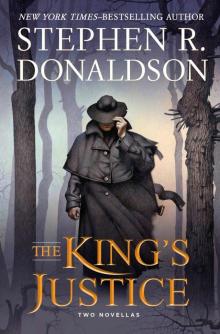 The King's Justice: Two Novellas
The King's Justice: Two Novellas The Wounded Land
The Wounded Land The Runes of the Earth
The Runes of the Earth Mordant's Need
Mordant's Need The One Tree
The One Tree Gilden-Fire
Gilden-Fire Reave the Just and Other Tales
Reave the Just and Other Tales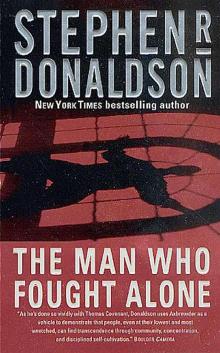 The Man Who Fought Alone
The Man Who Fought Alone The Last Dark
The Last Dark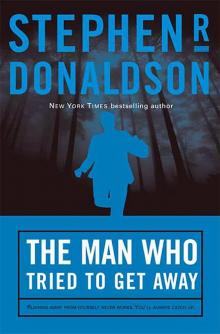 The Man Who Tried to Get Away
The Man Who Tried to Get Away Thomas Covenant 02: The Illearth War
Thomas Covenant 02: The Illearth War A Dark and Hungry God Arises
A Dark and Hungry God Arises The One Tree t2cotc-2
The One Tree t2cotc-2 Lord Foul's Bane cotc-1
Lord Foul's Bane cotc-1 The Illearth War t1cotc-2
The Illearth War t1cotc-2 The Runes of the Earth: The Last Chronicles of Thomas Covenant - Book One
The Runes of the Earth: The Last Chronicles of Thomas Covenant - Book One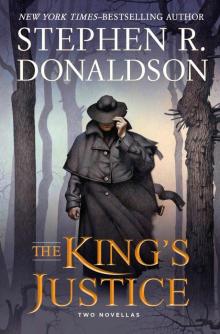 The King's Justice
The King's Justice White Gold Wielder t2cotc-3
White Gold Wielder t2cotc-3 The Power That Preserves t1cotc-3
The Power That Preserves t1cotc-3 Thomas Covenant 01: Lord Foul's Bane
Thomas Covenant 01: Lord Foul's Bane Chaos and Order: The Gap Into Madness
Chaos and Order: The Gap Into Madness Daughter of Regals
Daughter of Regals Forbidden Knowledge: The Gap Into Vision
Forbidden Knowledge: The Gap Into Vision Fatal Revenant t3cotc-2
Fatal Revenant t3cotc-2 The Runes of the Earth t3cotc-1
The Runes of the Earth t3cotc-1 Thomas Covenant 03: Power That Preserves
Thomas Covenant 03: Power That Preserves This Day all Gods Die: The Gap into Ruin
This Day all Gods Die: The Gap into Ruin The Wounded Land t2cotc-1
The Wounded Land t2cotc-1 This Day All Gods Die
This Day All Gods Die One Tree
One Tree